|
|
|
Sort Order |
|
|
|
Items / Page
|
|
|
|
|
|
|
| Srl | Item |
| 1 |
ID:
157829
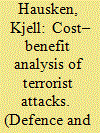

|
|
|
|
|
| Summary/Abstract |
A cost–benefit analysis of terrorist attacks is developed and placed within a systematic theoretical structure. For the target or object of the attack, we consider the lost value of human lives, lost economic value, and lost influence value, counted as benefits for the terrorist. The corresponding losses for the terrorist are counted as costs. The terrorist attacks if benefits outweigh costs. Bounded rationality is enabled where the three kinds of benefits and costs can be weighted differently. We account for two ex ante probabilities of successful planning and attack, and enable the terrorist to assign different weights to its multiple stakeholders. We introduce multiple time periods, time discounting, attitudes towards risk, and subcategories for the benefits and costs. The cost–benefit analysis is illustrated with the 11 September 2001 attack, and 53 incidents in the Global Terrorism Database yielding both positive and negative expected utilities. The paper is intended as a tool for scientists and policy-makers, as a way of thinking about costs and benefits of terrorist attacks.
|
|
|
|
|
|
|
|
|
|
|
|
|
|
|
|
| 2 |
ID:
157832
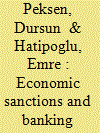

|
|
|
|
|
| Summary/Abstract |
What effect do economic sanctions have on the stability of banking systems in targeted economies? This manuscript advances the hypothesis that economic sanctions increase the likelihood of systematic banking crises by deteriorating the target economy’s macroeconomic conditions and limiting its access to international capital. To test the argument, we gathered data for over 125 emerging economies for the years from 1970 to 2005. The findings indicate that sanctions are likely to raise the probability of banking crises. The results also show that financial sanctions are more detrimental to the stability of banking systems than trade sanctions. Further, we find that the hypothesized effect of sanctions is conditioned by the extent of economic cost inflicted on targeted economies. One major implication of the findings is that sanctions, as external shocks, can potentially destabilize the financial stability of target countries in addition to the well-documented adverse effects on economic growth, political stability, and humanitarian conditions.
|
|
|
|
|
|
|
|
|
|
|
|
|
|
|
|
| 3 |
ID:
157833


|
|
|
|
|
| Summary/Abstract |
We use a unique data-set gathered during a short-lived interwar period in the Nuba Mountains of Sudan to compare characteristics of the households returning after the conflict with those that stayed in their communities of origin. We found that returning households seemed to face worse economic conditions, particularly in the case of female-headed returnee households. Nevertheless, our results show that returnees tend to perform better on different health indicators. Using a detailed set of variables about hygiene and sanitary habits, we explore the hypothesis that the latter result may be related to changes in attitudes given the distinct experiences during displacement. We show that returnees are indeed more likely to adopt these measures.
|
|
|
|
|
|
|
|
|
|
|
|
|
|
|
|
| 4 |
ID:
157830
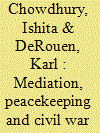

|
|
|
|
|
| Summary/Abstract |
The post-civil war agreement phase is vulnerable to credible commitment problems, a lack of government capacity to implement, and/or mutual vulnerability to retribution from violating the agreement. This study’s main contribution is to demonstrate the combined utility of mediation and UN peacekeeping. Mediation builds trust and confidence and works with the parties to design an efficacious agreement conducive to, among other features, tamping down post-agreement violence. Peacekeeping stems violence and facilitates the implementation of the agreement. Agreements that are mediated and followed by UN peacekeeping are expected to be more robust in terms of staving off violence. We report the effects of the mediation–peacekeeping interaction using a method correcting for a common misinterpretation of interaction terms. We test logit and hazard models using a sample of full and partial civil war peace agreements signed between 1975 and 2011. Controlling for agreement design, democracy, and income per capita, the results indicate mediation and its interaction with peacekeeping reduce the probability of renewed/continuing violence and have a positive impact on agreement duration. We also report brief case study evidence from the 1990s peace process in Guatemala.
|
|
|
|
|
|
|
|
|
|
|
|
|
|
|
|
| 5 |
ID:
157831
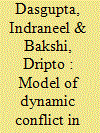

|
|
|
|
|
| Summary/Abstract |
We model an infinitely repeated Tullock contest, over the sharing of some given resource, between two ethnic groups. The resource is allocated by a composite state institution according to relative ethnic control; hence the ethnic groups contest the extent of institutional ethnic bias. The contest yields the per-period relative influence over institutions, which partly spills over into the next period, by affecting relative conflict efficiency. Our model generates non-monotone evolution of both conflict and distribution. Results suggest that external interventions, when effective in reducing current conflict and protecting weaker groups, may end up sowing the seeds of greater future conflict.
|
|
|
|
|
|
|
|
|
|
|
|
|
|
|
|
| 6 |
ID:
157828
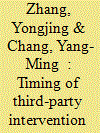

|
|
|
|
|
| Summary/Abstract |
This paper analyzes how the equilibrium outcome of social conflict between factions is strategically altered by third-party intervention. We consider an intervening third party that commits financial support to one of two contending factions for reducing its cost in conflict. Within the framework of three-player sequential-move games, we investigate the questions as follows. What is the optimal intervention intensity in terms of the third party’s financial support? Is there a first-mover advantage in conflict when there is third-party intervention? Fighting against all odds, will the unsupported faction have a chance to prevail when its opponent receives third-party support? What is the optimal timing of third-party intervention? The analysis in the paper has implications for the conditions under which the strategic intervention of a third party may or may not break a conflict between factions.
|
|
|
|
|
|
|
|
|
|
|
|
|
|
|
|
|
|
|
|
|